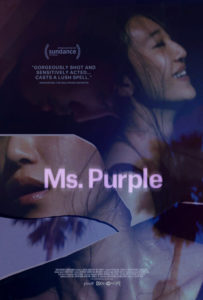 This stylish drama set in L.A.’s Koreatown tells the story of a young woman’s dedication to family at the expense of her own happiness and her gradual return to a fulfilling life. Tiffany Chu stars as Kasie, a 23-year old first-generation Korean American who’s stuck working as a hostess/call girl in a karaoke bar so she can take care of her comatose father. But when her home health aide abruptly quits, she calls on her estranged brother Carey (Teddy Lee) for help, and she begins to reexamine her relationship with him and with the life she’s been living. It’s a slow, but beautifully wrought tale.
This stylish drama set in L.A.’s Koreatown tells the story of a young woman’s dedication to family at the expense of her own happiness and her gradual return to a fulfilling life. Tiffany Chu stars as Kasie, a 23-year old first-generation Korean American who’s stuck working as a hostess/call girl in a karaoke bar so she can take care of her comatose father. But when her home health aide abruptly quits, she calls on her estranged brother Carey (Teddy Lee) for help, and she begins to reexamine her relationship with him and with the life she’s been living. It’s a slow, but beautifully wrought tale.
Kasie is very beautiful and very sad. She feels responsible for her dad and lives with him in a tiny house. She also has a paid relationship with a rich guy who treats her badly. That’s just her lot in life. But when her brother comes back, and it’s no longer all on her shoulders and he’s really there for her, she starts to see some hope. Even though she’s in the “relationship,” she goes on a real date with a nice guy who’s a valet. And rather than the fake smiles she flashes at work and with the rich guy, she’s really having fun. It’s as if she is thawing out after being frozen for too long.
Through flashbacks we learn that Kasie and Carey were abandoned by their mother. And that Carey and their father had a violent falling out. But it’s clear that Kasie loves having her brother back. It’s a tender relationship, not all gushy, and the scenes with the two of them ring true to the way brother/sister interactions unfold as you deal with common pain.
Tiffany Chu’s performance makes Ms. Purple worth seeing. Her emotions are raw and subtle. The rest of the cast are also good, but she stands out. The gorgeous cinematography of Ante Cheng gives the film a very stylishly saturated edge and the score keeps the mood going. It’s ultimately a story of empowerment, as Kasie finds herself again. And I recommend it to wide audiences looking for an indie gem.
